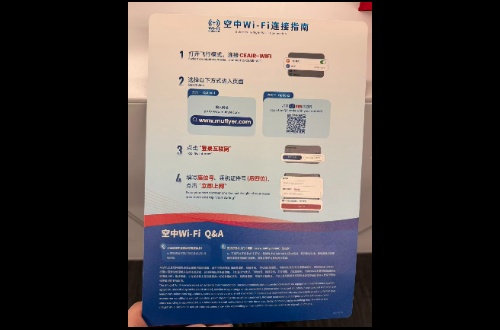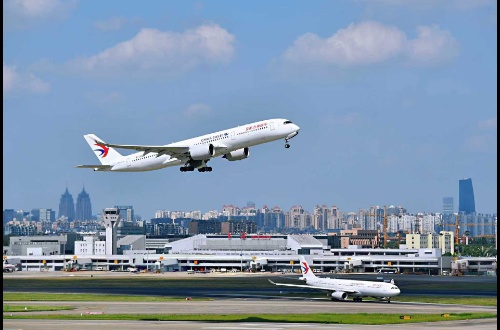Newest
-

CYCJET: Providing innovative marking solutions for industrial intelligence along the Belt and Road Initiative.
-

Celebrating in the Sky: China Eastern Airlines to Offer Free In-Flight Wi-Fi as Part of Chinese New Year Connectivity Upgrade
-

China Eastern Airlines Unveils Top International and Regional Destinations as Chinese New Year Travel Peaks
-

MEXC COO Vugar Usi on Navigating Crypto's 2026 Reset: Why Retail-First Exchanges Are Winning
We are Wellington Taking to the skies, Tom ‘21
 2021-04-25
2021-04-25

The 2020-21 academic year is fast coming to a close. Soon, another class of Wellingtonians will go out into the world to accomplish great things. Until then, we are giving some of our 2021 Leavers the opportunity to reflect on their time at international school Shanghai and what they intend to accomplish after they leave.
Today, we talk with year 13 pupil Tom. Not all of us are fortunate enough to know our career path as early as Tom did. Since age three, he has wanted to be a pilot. In his seven years at Wellington, his path of study has largely been in service of realising this goal, from his maths and science coursework to his IB Extended Essay. Outside of class, he gets as much stick time as he can, whether he is flying a Britten-Norman Islander with his uncle or practising on his computer simulator at home. This fall, Tom will be putting all of this preparation to good use as he begins to train for his private pilot licence in Hamburg, Germany.
How Wellington has helped him learn to fly

"Learning to fly is a process not only of memorisation but also of familiarity. Similarly, at Wellington, it is not all about the numbers or the facts. It is about becoming familiar with your subject areas and becoming one with your interests and being able to explore that. There is no direct flying course here. Aviation does not fit neatly into just one academic subject anyway. Nevertheless, Wellington's offerings in subjects like maths, physics and computer science have equipped me to pursue something highly technical, like aviation."
"Being able to do such a broad range of things has enabled me to focus on what I think is necessary for this career path. For example, we do a lot of mechanics in physics class, and that is very much akin to what is needed for this profession. IB enabled me to specialise even further with the Extended Essay. I chose aeronautical engineering, and I wrote about wingtip vortices, which is an aerodynamic phenomenon. I think all of this has given me a head start in the private pilot licence courses I will be taking next year. Not everybody gets an advantage like this, and I am truly grateful for it."
How learning to fly has helped him at Wellington

"I have wanted to fly since about the age of three, and I started learning how to do it at a relatively young age. My uncle is a pilot, and every summer, I would get to have a go at it, and I grew a little with every attempt — taking off, landing, manoeuvring. The very nature of flying is pushing boundaries and going beyond frontiers. That definitely ties into academia; you push yourself beyond what you formerly thought you could do."
"My TOK presentation was on something very similar to that. We were talking about the idea of impossibility. In the late 19th century, it was believed that heavier-than-air travel was impossible. So we discussed the idea of what 'impossible' means — whether or not it is just a figurative term, or if it actually means that something cannot be done. Because, sure enough, we were eventually able to prove this idea wrong. So what if we move that line of thinking into realms that we think of today as impossible, like the idea of faster-than-light travel? So it is this idea that what we think is possible today is not fixed to that term. It is more just an endpoint to our knowledge that we can push beyond. I think that applies to everything in life, academics included."
Looking ahead to next year

"Nowadays, the piloting profession is dependent on pilots with practical ability. So I have decided to enrol in a pilot school in Hamburg. I will be learning the theoretical components of aviation, taking courses on weather and flight dynamics. Meanwhile, I will be logging a couple thousand hours of actual flight time as well. After that, I will move on to even more challenging subject matter, like nighttime flying and instrument ratings. I always thought that going to university to study something like aeronautical engineering after getting some training as a pilot might be a good path to take. But, right now, I am keen to get my pilot's licence first."
Advice for our current pupils

I have always wanted to fly. I know there are others, like me, who have strong ideas of what they want to pursue. I would just say to them, "Do it at all costs." If you are unsure what you want to do, then look towards your interests rather than towards the money. Like they say, "Do what you love, and you will never work a day in your life."
